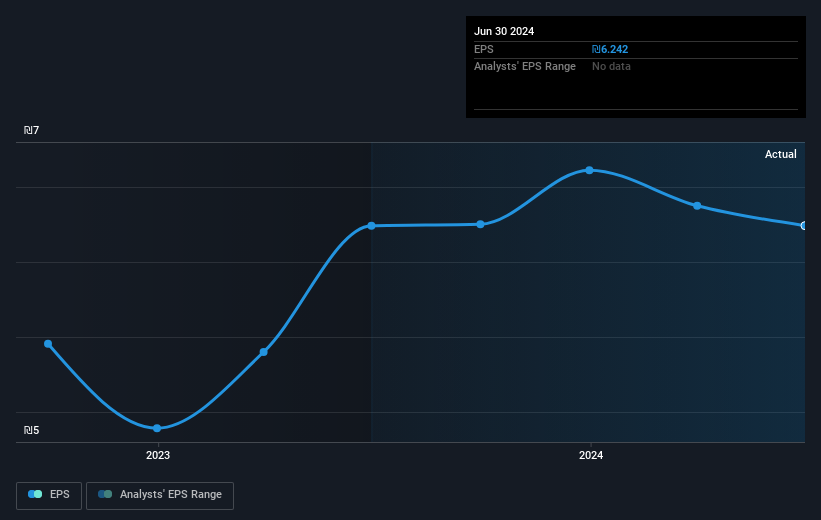Kerur Holdings (TLV:KRUR) earnings and shareholder returns have been trending downwards for the last three years, but the stock surges 13% this past week

While it may not be enough for some shareholders, we think it is good to see the Kerur Holdings Ltd. (TLV:KRUR) share price up 18% in a single quarter. But that cannot eclipse the less-than-impressive returns over the last three years. In fact, the share price is down 24% in the last three years, falling well short of the market return.
While the stock has risen 13% in the past week but long term shareholders are still in the red, let's see what the fundamentals can tell us.
View our latest analysis for Kerur Holdings
While the efficient markets hypothesis continues to be taught by some, it has been proven that markets are over-reactive dynamic systems, and investors are not always rational. One way to examine how market sentiment has changed over time is to look at the interaction between a company's share price and its earnings per share (EPS).
During the three years that the share price fell, Kerur Holdings' earnings per share (EPS) dropped by 5.7% each year. The share price decline of 9% is actually steeper than the EPS slippage. So it's likely that the EPS decline has disappointed the market, leaving investors hesitant to buy.
The image below shows how EPS has tracked over time (if you click on the image you can see greater detail).

We're pleased to report that the CEO is remunerated more modestly than most CEOs at similarly capitalized companies. It's always worth keeping an eye on CEO pay, but a more important question is whether the company will grow earnings throughout the years. Before buying or selling a stock, we always recommend a close examination of historic growth trends, available here..
What About Dividends?
It is important to consider the total shareholder return, as well as the share price return, for any given stock. The TSR incorporates the value of any spin-offs or discounted capital raisings, along with any dividends, based on the assumption that the dividends are reinvested. So for companies that pay a generous dividend, the TSR is often a lot higher than the share price return. In the case of Kerur Holdings, it has a TSR of -14% for the last 3 years. That exceeds its share price return that we previously mentioned. And there's no prize for guessing that the dividend payments largely explain the divergence!
A Different Perspective
Kerur Holdings provided a TSR of 14% over the last twelve months. But that return falls short of the market. On the bright side, that's still a gain, and it's actually better than the average return of 0.6% over half a decade This could indicate that the company is winning over new investors, as it pursues its strategy. It's always interesting to track share price performance over the longer term. But to understand Kerur Holdings better, we need to consider many other factors. For example, we've discovered 2 warning signs for Kerur Holdings (1 is a bit unpleasant!) that you should be aware of before investing here.
If you like to buy stocks alongside management, then you might just love this free list of companies. (Hint: many of them are unnoticed AND have attractive valuation).
Please note, the market returns quoted in this article reflect the market weighted average returns of stocks that currently trade on Israeli exchanges.
Valuation is complex, but we're here to simplify it.
Discover if Kerur Holdings might be undervalued or overvalued with our detailed analysis, featuring fair value estimates, potential risks, dividends, insider trades, and its financial condition.
Access Free AnalysisHave feedback on this article? Concerned about the content? Get in touch with us directly. Alternatively, email editorial-team (at) simplywallst.com.
This article by Simply Wall St is general in nature. We provide commentary based on historical data and analyst forecasts only using an unbiased methodology and our articles are not intended to be financial advice. It does not constitute a recommendation to buy or sell any stock, and does not take account of your objectives, or your financial situation. We aim to bring you long-term focused analysis driven by fundamental data. Note that our analysis may not factor in the latest price-sensitive company announcements or qualitative material. Simply Wall St has no position in any stocks mentioned.
About TASE:KRUR
Kerur Holdings
Through its subsidiaries, operates in the food sector in Israel.
Excellent balance sheet with acceptable track record.


